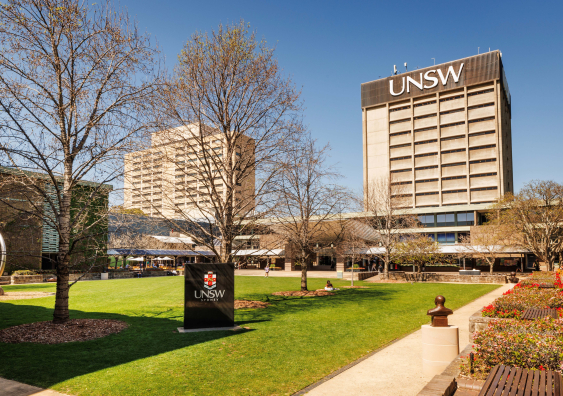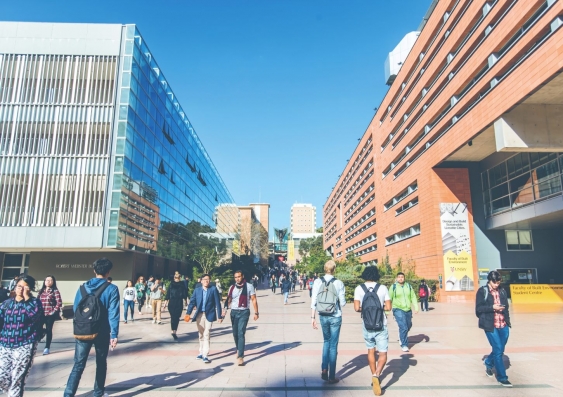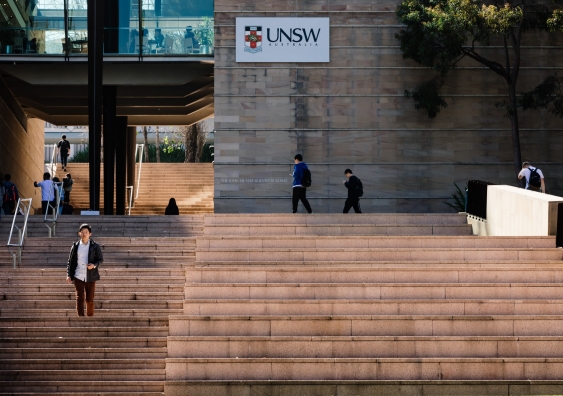UNSW receives more than $41m for 64 ARC Discovery Projects
2024-11-27T10:47:00+11:00

UNSW researchers have been awarded more than $41 million in the latest round of Discovery Projects grants from the Australian Research Council.
Photo: UNSW Sydney
The grants will support research in engineering, science, medicine, law, business and the humanities.
UNSW Sydney academics from the faculties of Science, Engineering, Medicine & Health, Law & Justice, the UNSW Business School, Arts, Design & Architecture and UNSW Canberra, have secured funding in the latest Discovery Project round from the Australian Research Council (ARC).
In total, 64 UNSW projects have been given more than $41million in this round of competitive grants from ARC.
Professor Bronwyn Fox, Deputy Vice-Chancellor Research & Enterprise at UNSW, congratulated the academics who received funding.
“The grants support excellent fundamental research across a diverse range of areas at UNSW, from addressing modern slavery in the fishing industry across the Indo-Pacific, to uncovering the biological processes behind bone health. We’re proud of all our academics who have been successful in this round of ARC Discovery funding,” Prof. Fox said.
Successful applicants include:
Professor Lynne Bilston from UNSW Engineering and NeuRA has received $1,263,000 for a project that will advance our understanding of the biomechanics and neuromuscular control of the pharynx (throat). The project will develop a 3D neuro-biomechanical model to simulate breathing and swallowing, offering the first comprehensive insight into how neural drive, anatomy, and sensation interact. The model will serve as a foundation for designing innovative oral devices and sensors to address challenges in breathing and swallowing.
Scientia Professor Justin Gooding from UNSW Science has received $1,118,000 for a project to improve fluorescence microscopy using electrochemistry. The research will enhance the ability to see and detect individual molecules and pave the way for single-molecule counting. This breakthrough could lead to the development of sensors with unprecedented sensitivity, eliminating the need for calibration. The project will deepen understanding of the underlying chemistry, drive the commercialisation of advanced microscopes, and enable innovative sensing technologies, offering new tools to explore and understand the molecular world.
Conjoint Professor Tri Phan from Garvan Institute of Medical Research and UNSW Medicine & Health has received $1,050,000 to investigate a newly discovered bone cell process. The research will explore how osteoclasts, the giant cells that break down and remodel bone, split into smaller cells called osteomorphs during bone resorption. By studying whether metabolic stress triggers this cell splitting, the project aims to uncover how these cells function and their role in bone health, providing new insights into bone biology.
Professor Justine Nolan and Professor Natalie Klein from UNSW Law & Justice have received $742,000 for a project addressing modern slavery in the fishing industry across the Indo-Pacific. The research will identify the legal and practical barriers to providing remedies for affected workers and propose solutions under Australian, regional, and international laws. By engaging extensively with stakeholders, the project aims to create realistic mechanisms for greater accountability and improved remedies. The findings will contribute to advancing human rights at sea, informing business practices, and shaping Australia's post-2025 National Action Plan to Combat Modern Slavery.
The grants support excellent fundamental research across a diverse range of areas at UNSW, from addressing modern slavery in the fishing industry across the Indo-Pacific, to uncovering the biological processes behind bone health.
Professor Pauline Grosjean from the UNSW Business School has received $619,000 for a project exploring how masculinity norms contribute to persistent gender gaps. The research will include a large-scale survey across 40 countries to map cultural patterns of masculinity, examine how these norms influence gender disparities in areas like economics, health, and politics, and use experimental methods to study their impact on decision-making. The findings aim to enhance understanding of how cultural norms shape outcomes and provide practical policy recommendations to promote more inclusive economic growth.
Professor Jiankun Hu from UNSW Canberra has received $501,000 for a project aimed at advancing bio-cryptography, a technology that combines cryptography and biometrics to enhance security. With the Australian Competition and Consumer Commission reporting identity theft causing over $10 million in reported losses in 2022, this research seeks to overcome the technical barriers that have slowed bio-cryptography's progress, particularly the integration of biometric authentication into cryptographic systems. By creating a unified framework and a new knowledge base, the project hopes to provide practical solutions for combating identity theft and strengthening Australia's cybersecurity defences.
Professor Alison Bashford from Arts, Design & Architecture has received $320,000 for a project investigating the history of dermatoglyphics – the study of patterns on human and primate hands – over the 20th century. By examining its role in physical anthropology, comparative anatomy, and population genetics, the research will explore this little-understood aspect of “race science” and its legacy, including its use in Australia. The findings aim to enhance our understanding of the ethical implications of past and present practices in human, medical, and life sciences.
The $41 million in grants to UNSW are part of the more than $342 million in funding announced by ARC for 536 new projects.
Discovery Projects, a flagship scheme for fundamental research and the largest scheme under the ARC National Competitive Grants Program, funds projects with between $30,000 and $500,000 each year for up to five consecutive years.
Read about all the ARC Discovery Projects in this round .
Media enquiries
For enquiries about this story and interview requests please contact Yolande Hutchinson:
Tel: 0420 845 023
Email: y.hutchinson@unsw.edu.au













